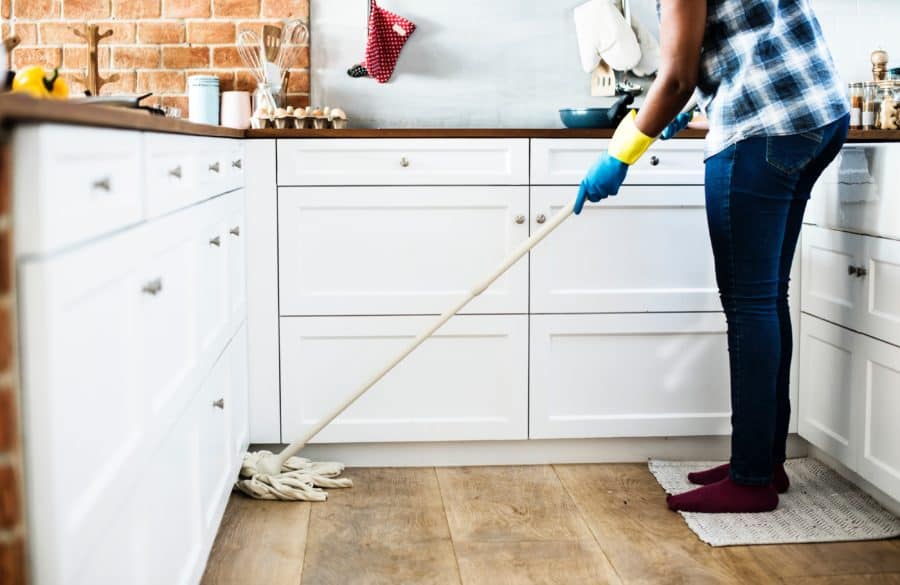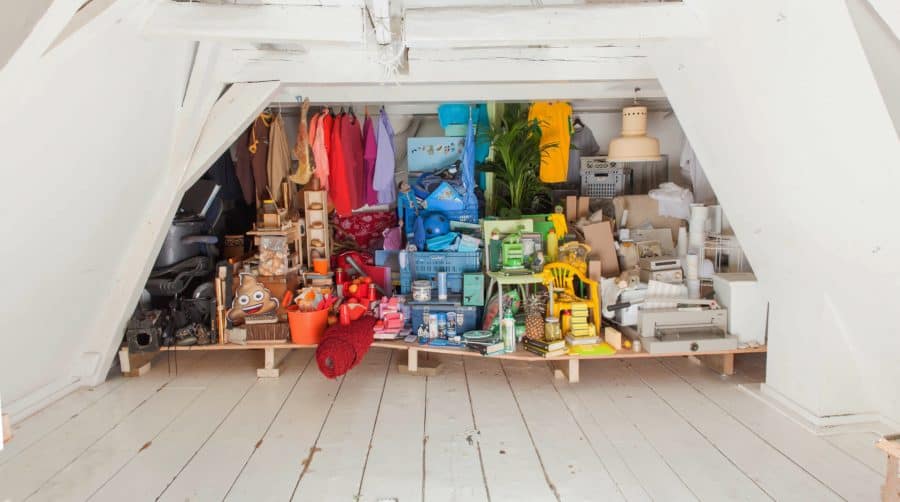Three years ago I bought a house for my daughter and myself. I bought it knowing that at some point my girlfriend and her daughter would most likely move in – but for the time being, it was my house. I had just enough furniture to fill the place, which was fine because it needed a fair amount of work anyway.
Sure enough, a few months later, my girlfriend and her daughter moved in. And through some puzzle of architecture, the house got smaller. Suddenly we had two of everything: two couches, two baby bath tubs, two kitchen trash cans, and two acoustic guitars (both hers).
As much as I wanted them to move in, I suddenly felt like my space was being invaded. It was a weird emotional contradiction. I want you here, but maybe just don’t touch anything? The bottom line is that cohabitation is no small adjustment, and it’s taken the last few years for my girlfriend (who’s now my wife) and me to find balance living in the same space.
That’s what cohabitation is about: balance, compromise, and two acoustic guitars that neither of you actually play. If you and your partner are thinking about cohabitation, stop thinking and start talking about it. Here are a few points to consider.
Divide the Labor
My wife loves to do yard work; I love to clean the bathroom. I’ll make a faucet shine like a new penny.
Neither of us enjoys taking out the trash; however, we both love pushing the trash down over and over, hoping the other will take it out.
Cohabitation is about balance and flexibility, and this is especially true when it comes to dividing the labor. It’s important to decide which chores you love, which chores you hate, and which neither of you mind – then divide accordingly.
It’s also important to create reasonable accountability for your chores. What does reasonable accountability mean?
Let’s start with accountability. Once you’ve divided up the chores, you need to make sure you both actually – you know – do them. If you divvy up chores and then one partner continually picks up slack for the other, it’s a recipe for resentment.
The solution? Borrow a technique from hospitals and post a dry erase board in the kitchen or utility room. Do a task, get a check.
For a digital solution, type up a shared calendar or Google Keep checklist.
Now, the reasonable part: if the way you’ve divided up chores isn’t practical, or one of you is working longer hours, it’s important to be flexible. Division of labor is less about keeping score and more about building new habits with the shared mindset of doing your share.
Implement De-Cluttering Power Periods
Combining lives means combining stuff, which means immediate clutter. My wife and I hate clutter, but we also have three kids under age five and two dogs. So…clutter.
While I’d like to think that I have a higher tolerance for clutter, all that really means is that I’m better at making piles of stuff around the house.
My wife and I have found a meet-halfway solution on clutter: daily power periods.
We take fifteen minutes and do a quick clutter sweep before bed. It’s easy for me, and it makes her feel better.
If we’re having people over, that fifteen minute power period becomes an hour.
For those persistent problem areas, devise a plan of attack and spend a little money to solve the problem with small boxes, drawer organizers, and space bags.
Get On The Tidying Bandwagon
Organization isn’t just about your home looking nice; it also brings a sense of order and control.
If you’re not sure where to start, check out Tidying Up with Marie Kondo on Netflix. Marie will give you room-by-room instructions as to how to declutter your house.
Be warned: This show is frighteningly motivating; my wife and I watched one episode, and before I could ask if she wanted to watch another, she was on her way upstairs to start clearing out her closet.
In fact, NPR recently aired an interview with some Goodwill employees who say since the show has debuted, thrift stores across the country have seen a major uptick in donations, to the point that they can barely keep up.
Purge By Donating
Yes, you both have a nice kitchen trash can, but you only need one, and there’s no way in hell you actually need that much Tupperware. Figure out what’s essential and then purge.
The problem with purging is it’s tempting to say you’ll sell your old items on Facebook or Craigslist … and then never do it.
So try to get in the habit of donating, as it’s much faster than “We’ll sell it,” which in my house means it’ll sit in the basement for the next six months until it finds its way back into the folds of our life.
If it’s a dryer, sell it. If it’s that old throw blanket that you never use, donate it. Even somewhat threadbare towels can be donated to your local animal shelter. Someone else needs it more than you do.
Having Extras Is Okay… For A Good Reason
My wife and I both came into our marriage with our own hair dryers, and neither of us is especially fond of the other’s. So instead of trying to convert one another, we’ve decided we’ll have two hair dryers.
Downsize where you can, but you’re still individuals with preferences. So if it means you both need your own hair dryers, so be it.
Futureproof Your Cohabitation With Therapy
It doesn’t matter if this is your first cohabitation or your fourth. You have baggage, and so does your partner. When my wife and I started having the cohabitation conversation, we started going to couples therapy. We'd both been through divorces, both had a kid, and we wanted to make sure we knew how our emotional baggage would affect this new endeavor.
Therapy gets a bad rep, especially couples therapy, but you need to take this decision seriously. You’re two adults with completely different lives, and you’re about to start living under the same roof. Going to therapy isn’t a cry for help: it’s an emotional investment in your relationship.
You don’t go to therapy because you’re having problems: you go to therapy because you want to prevent problems in the future. Plus, if you start before there are real issues, it can be an intimate and revealing way to deepen your connection. You’ll probably even look forward to it. (Really.)
Agree In Advance: Who Pays the Bills?
This seems like an obvious conversation to have, but you’d be amazed at how often money can lead to arguments when you live together. Have an honest conversation about money: who’s going to pay which bills? What’s a fair split given your individual incomes?
If you plan on keeping your finances separate (which I’d recommend at least until you’ve tied the knot, and even then, it may not be the best choice for your relationship) set up a joint account JUST for the bills.
You can both put money in but still have financial independence. If you really want to keep things simple, split up the individual bills themselves: you pay the utilities; I’ll pay the groceries. That way you’re each responsible for the same bills each month.
Plan Cohabitation Escapes
Cohabitation works best when you get periodic escapes.
We’ve all heard this before: Once you live together, it's incredibly easy for “date night” to become “Netflix and fall asleep on separate couches.” Cohabitation means you have to be all the more intentional about going out, especially after you have kids.
Try to get out of the house at least once a week – and no one is saying these have to be expensive dinner dates. Go sit at a coffee shop or a bookstore. Go for a hike or have a picnic at a park. Do something that revolves around the two of you reconnecting after a busy week.
Date night has broader importance within your cohabitation and relationship: it’s about refusing to become complacent. If you’re a homebody or you consistently miss out on date night, support the process by setting a reminder in your phone so that one day a week (or every other week) is set aside.
Before the scheduled date night, take ten minutes and do a Google search to figure out the top rated restaurants in your area, then make a list on your phone. Whenever my wife and I are stumped about where to go next, she pulls out the list she has saved in her notes, and we choose a place we haven’t visited recently.
Keep Your Friends And Make New Ones Together
I have friends. My wife has friends. We have friends together. This is okay. These spheres can coexist, and while it’s great if they intersect, they don’t have to. It’s also okay to encourage your partner to go have time with their friends away from you.
When my wife is overwhelmed and suffering from cabin fever, she needs a night out with Jess, her best friend. When I’m in the same situation, I need one of my buddies to come over so we can fix something on my car or tackle a house project.
But to be honest, even this isn’t the healthiest approach. Instead of waiting until you’re overwhelmed, it’s a good idea to set aside a “friend date night” once a month (or more often if you can).
Time intentionally spent with friends brings out the best in us, so fidelity to your friendships will only become more important as your life becomes more complex and overloaded. Job, kids, home ownership, pets, and did I mention kids? All of these are wonderful, but they also take an emotional toll on both of you. See your friends. Make new friends. And then go DO stuff with them.
Cultivate Different Interests
I’ve loved photography since I got my first film camera when I was fourteen. My wife…kind of likes photography. I have a tendency to get frustrated when she doesn’t want to have a two-hour conversation with me about the advantages of a 35mm lens over a 50mm.
What matters, however, is that my wife encourages my love of photography. It's easy to get frustrated when someone doesn't share your passion. If you hit the gym with high fidelity, that's great, but your partner doesn't have to become a bodybuilder just because you are and just because you're now living together.
Like friends, hobbies can be independent with occasional overlap.
Remember, it’s Home for Both of You
When my wife moved into my house, I had to change my thinking to make sure it was OUR house. She needed to feel like she didn't need to ask me before rearranging the furniture (which she does every damn three weeks), or saying “Let's throw a new coat of paint on this room.”
If your partner is moving into your place, it’s their place now, too. Are you ready for that? If you're buying or renting a place new to both of you, have a conversation about what’s important to each of you aesthetically. And remember, be flexible.
What matters is that you and your partner start having conversations (plural) about moving in together. Everyone loves being in love, but no one likes losing their their own space. My wife and I have lived together for almost three years now, and each day we’re learning where we need to compromise and be flexible, and thus learning how to love each other better.























![It’s Time to Begin Again: 3 Uncomfortable Frameworks That Will Make Your New Year More Meaningful [Audio Essay + Article]](https://www.primermagazine.com/wp-content/uploads/2025/01/begin_again_feature.jpg)
